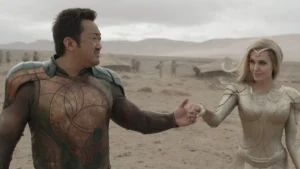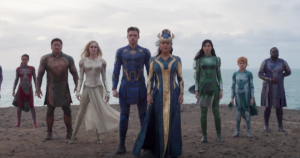SPOILERS FOR ARCANE: LEAGUE OF LEGENDS PART ONE AHEAD!
Netflix’s release strategy for Arcane: League Of Legends makes it one of the few original series’ on the steaming service that we get to enjoy across a span of multiple weeks, but Netflix has found a way to marry their hallmark binge-watch formula with the weekly format that other platforms have adopted to great success over the past two years. Instead of releasing just one episode each week, Arcane drops a bundle of three – each no fewer than forty minutes long – so that you still get to binge sizable chunks of the show, and the viewing experience will easily fill an evening whereas episodes of some Disney+ series’ fly by in less than an hour.

It’s a method that I think Netflix would be wise to utilize more often, at least for established series’ with large audiences willing to stick around week-to-week. One major complaint about the binge model is that even Netflix’s best and biggest series’ rarely get a chance to stay in the general conversation for more than a single weekend before viewers have finished the entire season and moved on to their next fleeting obsession. That in turns pulls focus away from the content of individual episodes and puts pressure on showrunners to write cliffhanger season finales that will keep general audiences from forgetting their show entirely.
But personally, I relish having an opportunity to review Arcane in segments. I pulled the first season of Shadow And Bone apart episode-by-episode, but that was an adaptation of a book series I already loved. If all ten episodes of Arcane had dropped on one day, I’d have only written a single review because I don’t know enough about the League Of Legends franchise to support ten separate posts – but I’d have missed the chance to dive into all of the animated series’ nuances, which are highlighted by this wonderful weekly-binge release strategy.
Episode four picks up several years after the events of episode three, which I think also helps support the weekly release – you feel like you’re actually watching the premiere of Arcane season two. And not only is it more epic in scope and heavier on action like the second season of an established series would usually be, but the characters have also developed exponentially. With just three episodes behind us, all that development could easily feel rushed or even unearned, but Arcane somehow makes it work. Every character is more abundantly alive and interesting than before, which might be why episodes four through six have a harder time focusing on any one in particular.
Positioned as the heart of the narrative both thematically and emotionally, yet slightly at risk of getting shoved aside by the jostling subplots of other characters this week, the orphaned and estranged sisters Violet (voiced by Hailee Steinfeld) and Powder (now going by the name of Jinx, and voiced by Ella Purnell) don’t actually meet until episode six, and even then only briefly, which prevents us from exploring the evolution of their relationship with each other. Individually, however, they’re still compelling co-leads.
Fascinatingly, despite Violet being the only member of Vander’s family to escape from the crime-lord Silco (Jason Spisak) at the end of episode three, it’s she who’s regressed and landed in a dank undercity prison while Jinx is thriving under Silco’s tutelage, moving freely between Zaun and Piltover. Over the years, she’s been fashioned into a killing machine and outfitted with an arsenal of hand-made weapons and gadgets, although her flair for the melodramatic is seen in her colorful carnival-performer aesthetic and the glee she derives from violence. She’s strongly reminiscent of DC Comics’ vivacious antihero Harley Quinn.

Somehow I get the sense that that comparison is overused and that League Of Legends fans everywhere are probably rolling their eyes at me, so I’m going to follow up by saying that there are two crucial differences between Jinx and Harley Quinn. One is Jinx’s struggle with childhood trauma, specifically the guilt of having caused two of her friends’ deaths and the shame and horror of being abandoned by her older sister. Watching her fight those feelings is extremely compelling, and it’s a shame that Arcane doesn’t put as much effort into crystallizing the dynamic between Jinx and Silco that I felt is another defining element of her character.
In fact, Silco almost disappears entirely in these three episodes, perhaps because there’s just one too many antagonists at this point. His new goals are hastily sketched out, but the show loses sight of the tormented and in my opinion quite fascinating character behind the menacing façade, leaving him with surprisingly little to do except sit behind a desk and brood, or else pop up here and there to frighten his various business partners into submission. The only consolation is that I’m sure his methodical preparations for the approaching war between Zaun and Piltover will pay off in the long run, and the results will be epic and catastrophic.
On that note, however, I’m also disappointed that we spend less time in Zaun over the course of these three episodes – and of the time we do spend there, significantly less of it is devoted to expanding on the themes of class and social divides that were established in the first three episodes. As the city of Piltover advances far ahead of Zaun, leaving the undercity’s inhabitants increasingly destitute and desperate, we’re only afforded brief glimpses into how life has changed for them since Vander’s death and the estrangement of the two cities.
Instead, these three episodes focus more on what’s happening “top-side” in Piltover, where brilliant inventor Jayce Talis (Kevin Alejandro) bridges the gap between science and magic to create all kinds of incredible technology for the city. But with fame and fortune comes power, and with power comes opposition. Jayce is reluctantly forced to navigate Piltover’s political scene and outmaneuver his enemies on the city’s council if he plans to achieve everything he knows he’s capable of, all while racing against the clock to save his business partner and closest friend Viktor (Harry Lloyd) from death.
Political intrigue is one of my favorite fantasy tropes ever, so it’s neat to see that element woven into the story, but Jayce isn’t really the focal point of this narrative as far as I can tell, and Arcane suffers from being spread a little thin in these three episodes as it struggles to find any connections between Jayce’s journey to the top of the world and Violet and Jinx’s intensely personal conflict mirroring the social divide for which Jayce is at least partly responsible. Their storylines will eventually overlap, but currently the only substantial crossover is through the character of Caitlyn (Katie Leung).
Although she only had a small role in the first three episodes as one of Jayce’s friends, Caitlyn really comes into her own in episode five, as she embarks on a solo mission into the undercity to locate Jinx and bring her to justice, only to discover that she’s become inextricably entangled in something much larger than herself – a vast corruption scandal linking Piltover’s law enforcement to the criminal enterprises of Zaun. She eventually meets Violet, and their romantic chemistry/sexual tension is off the charts. We stan a morally righteous queer character who will let her morally ambiguous girlfriend get away with just about anything.

There’s plenty to love in these three episodes, despite their flaws. The action in particular is even more dynamic and creative, and all the characters have matured into better fighters. The animation is still luscious, with Piltover even more beautiful thanks to Jayce Talis’ enhancements to the city. And this story continues to expand in unexpected directions across a world that is rich with detail. As we gear up for the final batch of episodes next week, I can only hope that Netflix decides to build out this franchise across multiple seasons and spin-offs. It’s what we deserve.
Episodes Rating: 7/10









